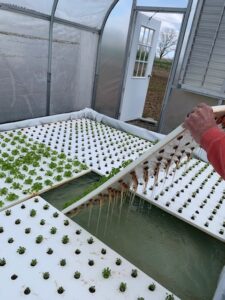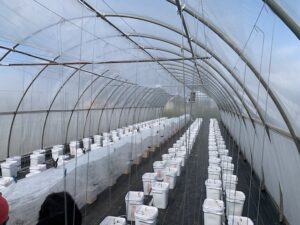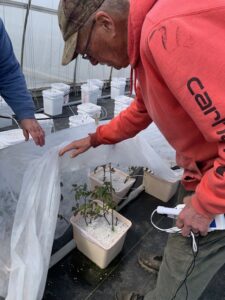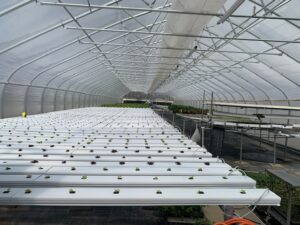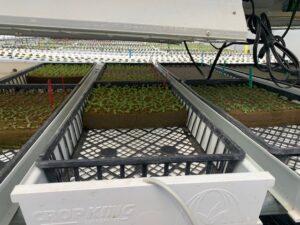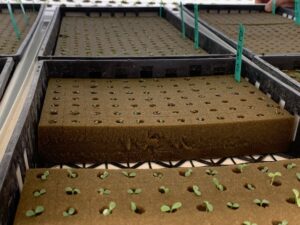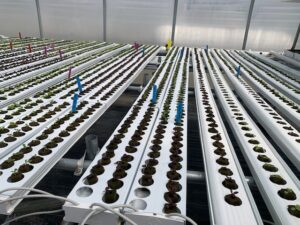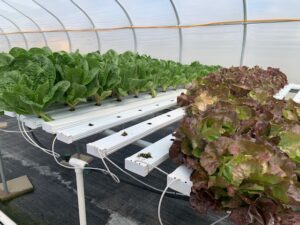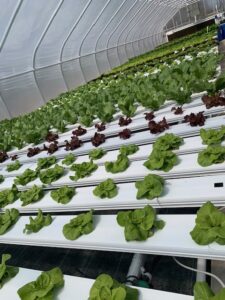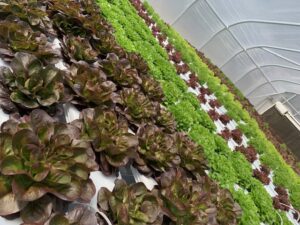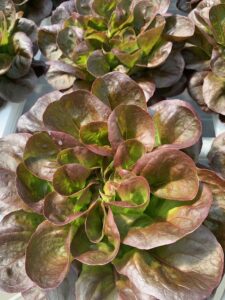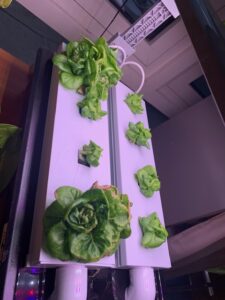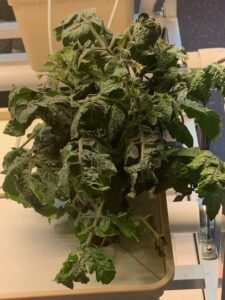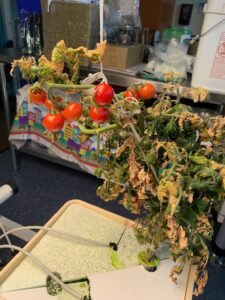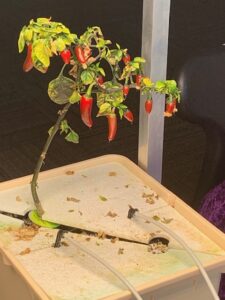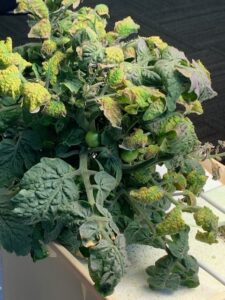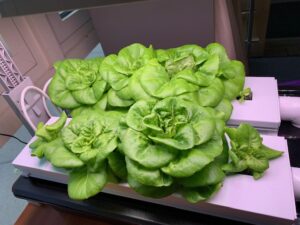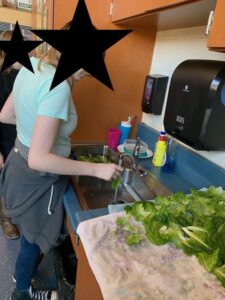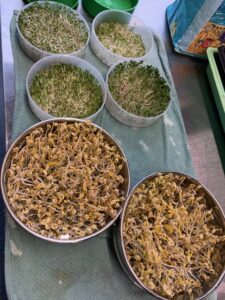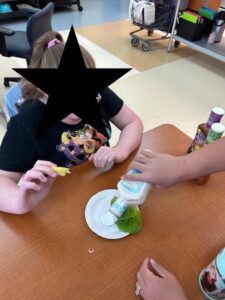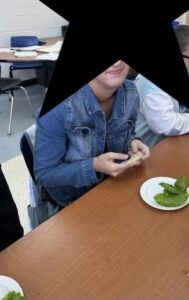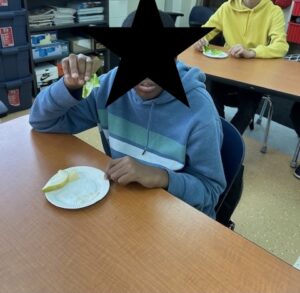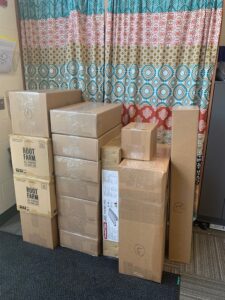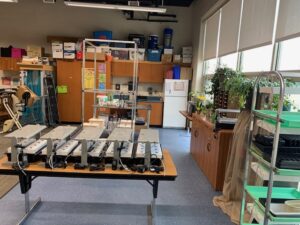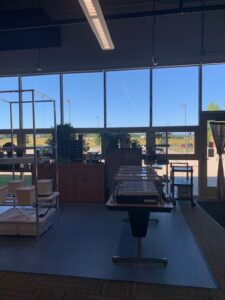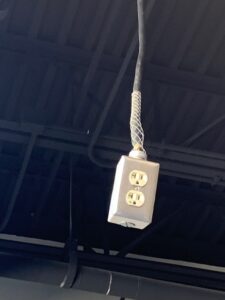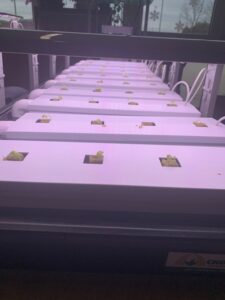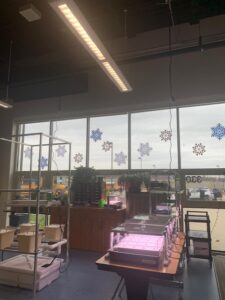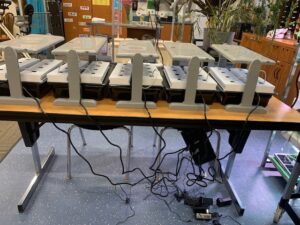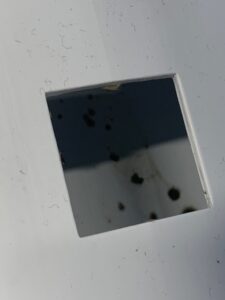Progress report for YENC23-192
Project Information
Through providing my high school students with multiple disabilities hands-on experience growing their own food utilizing hydroponics in the classroom setting, they will learn about and see first-hand what sustainable agriculture, social responsibility and having a self-sustaining food supply looks like. Given a controlled environment and supports, our students will gain employability skills as well as life skills through this opportunity. Connection with local farmers (traditional and hydroponic) will encourage job exploration and transfer of skills learned to a competitive gainful community employment setting. Pairing with typical "Buddies" from our school's FFA program will enhance the experience for all.
- Introduce students with multiple disabilities to hydroponic farming as a sustainable and environmentally responsible method for food production.
- Give students on-site, hands-on vocational training through employability skills experience with hydroponic growing systems.
- Make local connections for students with area farmers (traditional and hydroponic) to see transfer of skill and potential for future gainful competitive community employment opportunities.
- Inform our school's community of our experiences through social media, presentation at a board meeting, news coverage and offer abundance of produce grown with potential of fundraising as a means to continue the project into the future.
- Inspire our students and their families to adopt health consious eating habits by exposing them to and providing them with nutritious and delicious produce.
Cooperators
- (Educator)
Educational & Outreach Activities
Participation summary:
Upon the return to school this fall, we were informed that our department would only be allowed 4 field trips this school year, one of which had already been predetermined. We are working on maximizing the trips to cover everything we need them to include - and are hopeful that one trip this spring will be in conjunction with a local farm or hydroponics farmer. I have been cultivating a relationship with a local farmer who has a farm store and CSA in our school's community. She said that having my students visit would be very difficult with their farm's schedule and family commitments. There are others in our area, and I will continue to seek out the opportunities we are in need of.
UPDATE 1/30/2025: Through our challenges with our systems (thwarted growth, plugged tubing, imbalanced water, lettuce rust, death / loss of plants, etc), we were finally able to connect with a local hydroponics farmer whose operation is actually within our school district! Steve and Barb Willis's farm and business is called Just Farmin'. Barb is also a special education teacher, so Steve was eager to provide assistance. He provided a tour of their facilities,
tested my water samples, gave me tubing when ours became clogged, shared fertilizer and has been a wealth of information. As a result of his involvement, we were finally able to experience some success with lettuce growth!
When our lettuce plants were large enough to harvest, the students were very excited, eager to pull and were shocked at the results. 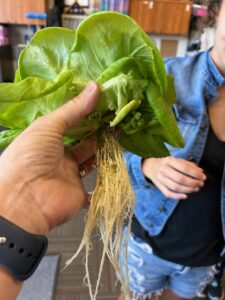
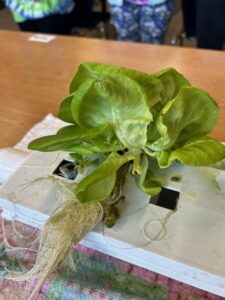
- The root systems of the plants were a lot longer than they had expected.
- The lettuce we harvested tasted great! Even students who were staunchly "non salad eaters" said it tasted good! We discussed the difference between lettuce grown in soil vs. hydroponics as well as eating fresh produce (we ate it approximately 15 minutes after harvesting) vs. produce that has been picked and packaged and shipped elsewhere, then sitting in a grocery store.....
- We had so much, we were able to send bags home with students who wanted to share with their families. They loved it!
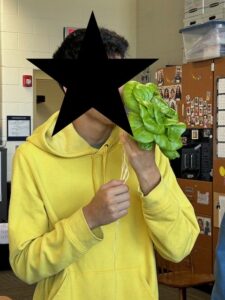
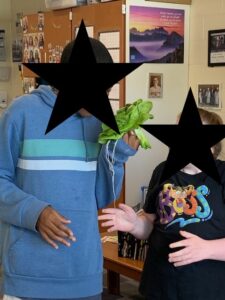
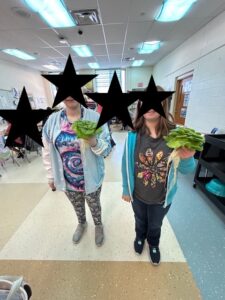
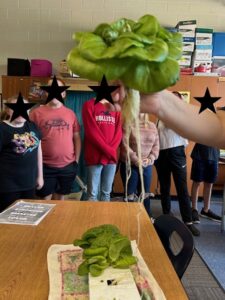
Our classroom has an extensive collection of houseplants. One of our favorites is a 28 year old Christmas Cactus that blooms 4-5 times / year. 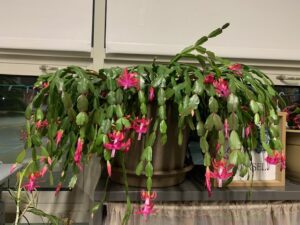
We began propigating it this fall, and were able to sell new plant starts at our school district's annual craft show. 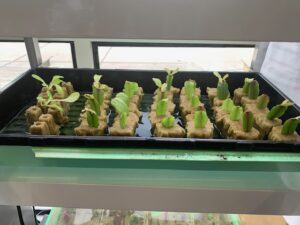
Propagating Christmas Cactus using hydroponics system has been highly successful, first in rockwool (pictured), then transferring to desktop systems. While it deviates from the idea of growing something to eat, it does still fall within the idea of growing something to sell - which we were able to do, experimentally. We have since returned to lettuce.
In our larger system, we grew tomatoes and peppers.
While the plants did not grow to be hearty, we did end up with fruit, so we will continue to tweak things with each round of plants that we grow.
What we have learned over all is that the more we attempt to "fix" the water (either adjusting the ph or the level of conductivity / fertilizer), the less successful we were and the more stressed and sickly our plants became.
Ironically, when we left things alone, the plants did much better, whether tomatoes, peppers or lettuce.
When they started not looking as healthy, we measured the levels of the water and made adjustments, but definitely not on the daily (or even weekly). When discussing this with our Edgewood High School Vocational Agriculture educator, Kellie Beiser, she stated that in her hydroponic towers, she NEVER does anything to the water - they just utilize the tap water as is, and have never had an issue. As we saw with multiple rounds, their plants were healthy and hearty. Shown here, is a student washing lettuce we harvested from their towers.
Our plan moving forward is to continue to improve our level of effectiveness with lettuce in our desktop systems, and to continue to experiment with tomatoes and cucumbers in the BATO Buckets. We have also obtained microgreen and mung beans which we are growing in small water based freestanding containers.
A couple staff members have expressed interest in purchasing our microgreens and mung bean sprouts, after seeing them. 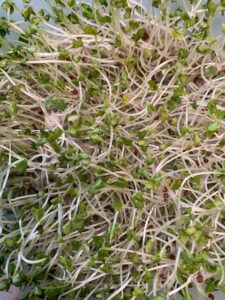
Students have tasted each, and have been surprised that they actually liked them! We have been extremely surprised and thrilled at our students' willingness to try everything they have grown. :)
- Other
Learning Outcomes
We, as a class, are learning what does NOT work.
While students are excited about growing their own food, and have seen and benefited from a successful model, our classroom experience has not yet been successful. We have learned that life is fragile and ALL conditions have to be in balance in order for life to thrive. Students are learning the process of trial and error and that we will continue to try. (Many life parallels here for my students with multiple disabilities!)
Here is a narrative of our experience thus far:
Last spring, the week before spring break when I attended the Grower's Workshop at Crop King, I personally spoke to our district treasurer and superintendent together, prior to a board meeting. I asked what needed to happen in order to make whatever adjustments may be necessary to accommodate electrical needs of the hydroponic equipment I would be acquiring the following week. They assured me that once it was here, anything that needed to be adjusted would be done if I put in a work order. With that in mind, I was proactive and inquired to Crop King about what kind of plugs / outlets and power supply would be necessary. I passed that information along to our maintenance head, who said it wouldn't require anything special. When I returned to school with the equipment, I invited the maintenance staff to come see what was needed. They looked and said everything was standard. I requested assistance / advice re: how to run the electricity (power strips, extension cords, etc). The work load was backed up, and nothing was completed.
8/2/23 - In preparation for the new school year, I set up the equipment and again requested maintenance to come advise how to run the power.
8/9/23 - I received an email from the Business and Facilities Coordinator who said that my work request had been received but that if the work could not be completed in house with supplies already on hand, the project would not move forward. I reminded them of the agreements that had been made in the spring, and of the contract in place.
Late August, maintenance came in to look at how the electricity sources were configured and made a plan to run conduit above the space and drop down to where the units were set up - however the materials were not readily available. In September, maintenance came in with pieces of materials they had removed from another building, and configured it above my units with a drop down box. I was told to run a power strip from the box to accommodate the plugs. I personally purchased power strips, only to find that the orientation of the outlets would not accommodate the plugs and the number of outlets needed exceeded availability. I again asked for purchasing advice, and was shown one that was suggested. We then ordered that power strip that "should be right." They arrived in October.
Late October through December: In the meantime, we started our lettuce and tomato seeds. When the power situation was rectified, we moved our lettuce seedlings to the desktop units. They failed to thrive and died. We repeated the process twice. Our tomato seeds never grew large enough to put in the BATO Bucket system. The Vocational Agriculture teacher in our building gave us some of her lettuce seedlings that were ready to transplant. They were sown in a different growing medium, which she said was worth trying to see if it was our medium or our systems that were not right. These plants also died.
Throughout 2024 we experienced many lows and a few highs, with the long awaited succeses of some tomatoes, peppers and lettuce.
It was discovered on 1/5/24 that the systems had mold growing in the water wells and tracks. We have been in touch with Crop King since then to determine the best way to eradicate the mold and problem solve / correct the issues. That communication is still in process. If it wasn't for the support of Crop King, I wouldn't know how to problem solve what is happening. They have sent me a video and we are in communication about what has happened and how to move forward. We will likely need to replace tubing, but the equipment itself has been cleansed properly. We also need to acquire additional seeds. Once these things have happened, we will start over.
From all of this, my students have learned that there is a lot of "hurry up and wait" and things often do not turn out as anticipated. Nonetheless, they also are seeing perseverance and problem solving and I believe that this model will prove in the long run that continuing to try and taking risks is better than quitting and giving up - and my hope is that in the end when they are enjoying fresh produce with their families, we will be able to discuss the importance of tenacity.
There is no doubt - the best experience is doing. No amount of curriculum can take the place of hands-on, personal experience. For my students with multiple disabilities, it is essential.
Project Outcomes
The support I have received from Crop King has been essential to this process. We are continuing to problem solve together in order to determine / correct the challenges we have had with our projects.
UPDATE 1/30/2025 While it seemed at first that Crop King was going to be supportive in helping me problem solve, I quickly learned soon after submitting my report, that they had undergone some management changes, and all of the sudden, I could not get anyone to return phone calls or emails. That is when I shifted my focus to local help - and ultimately connected with Steve Willis, of Just Farmin'. Thank goodness for his kindness and willingness to provide advice and help me problem solve!
